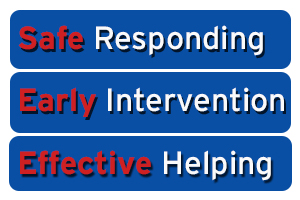You are here: American University Student Affairs StepUp About Step Up
Five Steps and 3Ds
Step Up, is an award-winning (NASPA Gold) bystander intervention program that teaches students how to intervene in problematic situations including alcohol abuse, hazing, depression, sexual assault, discrimination, anger, eating disorders, academic misconduct, and more. Have you witnessed one of these situations, but were not sure what to do? Here are five easy steps:
1. Notice the event.
Be aware of your surroundings and what is happening around you.
2. Interpret the event as a problem.
Sometimes, we are not sure what we are witnessing. For example, if you see a student laying on the Quad at 2:00 am. One could think the student is simply sleeping. But, what if the person is not sleeping and is actually having a medical emergency? Step 2 encourages students to trust their instincts. If something does not seem right, it probably is not. If a situation catches your attention and seems a bit off, interpret it is a problem.
3. Assume personal responsibility.
Bystander research shows people are less likely to help if they are in a large group or in a crowd. Why? Often we think someone else will help, or if everyone else is not helping, then it must not be a problem. Be that someone who does something. If not you, then who?
4. Know how to help.
The key to intervening effectively is knowing how and when to help, and more importantly, knowing how to help safely. The Step Up program uses the S.E.E. Model.

Safe Responding.
Do not put yourself in a dangerous situation. For example, if you witness an altercation, it may be safer to call Public Safety rather than approaching the individuals involved.
Early Intervention.
Intervening early can avoid a small problem from growing into an even bigger, more harmful problem. For example, it is easier (and safer) to convince your friend to stop drinking early in the evening than calling for an alcohol transport later.
Effective Helping.
Effective helping is any helping. The good news is, you have options! Read more about the 3Ds in step 5!
5. Step Up! Direct. Distract. Delegate.

- Direct - Directly addressing the situation.
For example, if someone is trying to take an intoxicated student to a room, you can directly intervene by taking the person aside and saying, "Hey man, she looks drunk. I do not think that's a good idea."
- Distract - Making a simple (or elaborate) distraction to diffuse the situation.
For example, if a couple is arguing and things are getting heated, you can call one of the person's cellphone or you can tell one of them that someone is outside urgently looking for him/her.
- Delegate - Finding someone else to address the concern.
This is a good option if you do not feel safe directly intervening, you are not sure what to do, or you simply do not want to get directly involved. Examples include, if you notice hazing activities, you can file an anonymous Hazing Report. If you are concerned about a friend's well being, you can tell an RA or a professional in the Counseling Center. If you are at a party and someone is trying to get someone else intoxicated, you can alert the party host.
